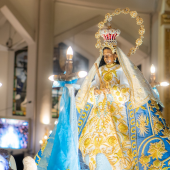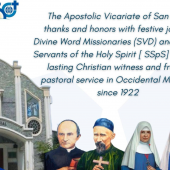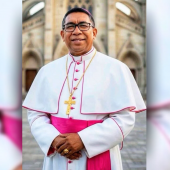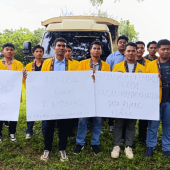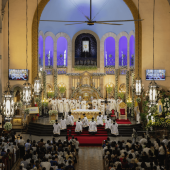Philippines: German Missionary’s Journey with the Indigenous People Gets Recognition
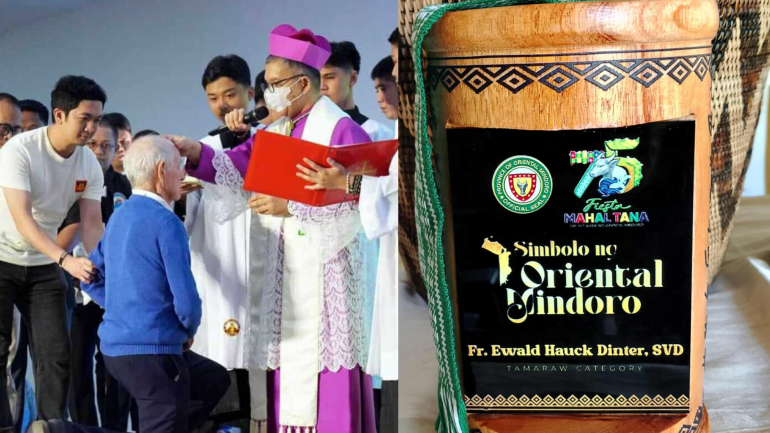
On November 12, Mangyan missionary Fr. Ewald Dinter, SVD, 88, was honored by the provincial government of Oriental Mindoro during its 75th founding anniversary for his six decades of dedicated service to the Indigenous Peoples (IP) of the province.
This latest recognition adds to numerous others he has received over the years, including distinctions from the Department of Education, the Society of the Divine Word (SVD), and the German government.
Fr. Dinter’s legacy includes the promotion of ancestral land rights, Indigenous Peoples’ education, and a culture of dialogue. In his work with the Mangyan communities, he follows the approach of Max C. Warren, who wrote: “Our first task in approaching another culture, another religion, is to take off our shoes, for the place we are approaching is holy. Else, we may find ourselves treading on people’s dreams. More seriously still, we may forget that God was here before our arrival.”
Fr. Dinter arrived in the Philippines in April 1967 at the age of 30. He has since served in Mindoro for nearly sixty years.
Before his mission among the indigenous Mangyan peoples, he served as parish priest in the towns of Bongabong and Mansalay, and later became the first Rector of St. Augustine Seminary, helping form priests for the local Church.
Mangyan Mission
Fr. Dinter founded the Mangyan Mission as a permanent institution supporting the Mangyan people, with its flagship program focused on securing and sustainably managing ancestral domains.
Although the issuance of Certificates of Ancestral Domain Titles (CADTs) is still pending, Mangyan communities have been empowered to safeguard and defend their lands through the creation of self-determining people’s organizations.
Education, both formal and through alternative delivery modes, has always been a priority. Schools were opened in several upland Mangyan communities and were eventually turned over to the Department of Education (DepEd).
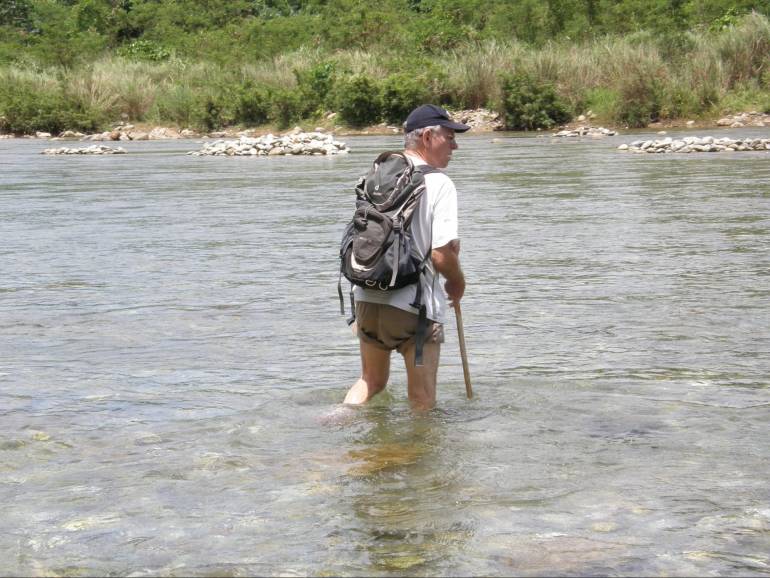
Fr. Dinter continued the work of the Mt. Tabor Mangyan Education Foundation, a formation program for Mangyan college students in Calapan City established in 1964 by Ms. Casimira Villegas.
In 1987, when no secondary schools were available for Mangyan youth in the southern towns of Mansalay and Bulalacao, Fr. Dinter founded the Mangyan Education Center (MEC) in Bait, Panaytayan, Mansalay. The school offered an education rooted in Mangyan culture and responsive to community needs.
Like Mt. Tabor, MEC has produced hundreds of Mangyan graduates who are now professionals serving their communities. Fr. Dinter has consistently maintained that education must be grounded in the perspectives, expressions, and aspirations of the Mangyan people.
He has also worked with other priests and religious serving IP communities across the country in advocating for the recognition of Indigenous Peoples Education (IPEd). Their collective lobbying resulted in the issuance of DepEd Order 62 in 2011 by then Secretary Armin Luistro, establishing the National Policy Framework on IP Education and recognizing IPEd as an integral component of DepEd programs.
In all of his journey with the Mangyan communities, Fr. Dinter emphasizes dialogue, especially in evangelization. “We offer the Good News of Jesus, but our work is with all, baptized or non-baptized,” he often reminds his co-workers in the Mangyan Mission.
He believes evangelization is a continuous process of inculturation: a constant dialogue and sharing of life with the Mangyan people. According to him, “genuine dialogue allows us to glimpse the soul of the Mangyan people, their values, thoughts, songs, poetry, feasts, dreams, human potentials, indigenous laws, governance, and problem-solving strategies.”
Fr. Dinter often challenges his co-workers with this question: “Can the Mangyans see and feel that the Good News of Jesus has become part of our lives?”
Radio Veritas Asia (RVA), a media platform of the Catholic Church, aims to share Christ. RVA started in 1969 as a continental Catholic radio station to serve Asian countries in their respective local language, thus earning the tag “the Voice of Asian Christianity.” Responding to the emerging context, RVA embraced media platforms to connect with the global Asian audience via its 21 language websites and various social media platforms.










